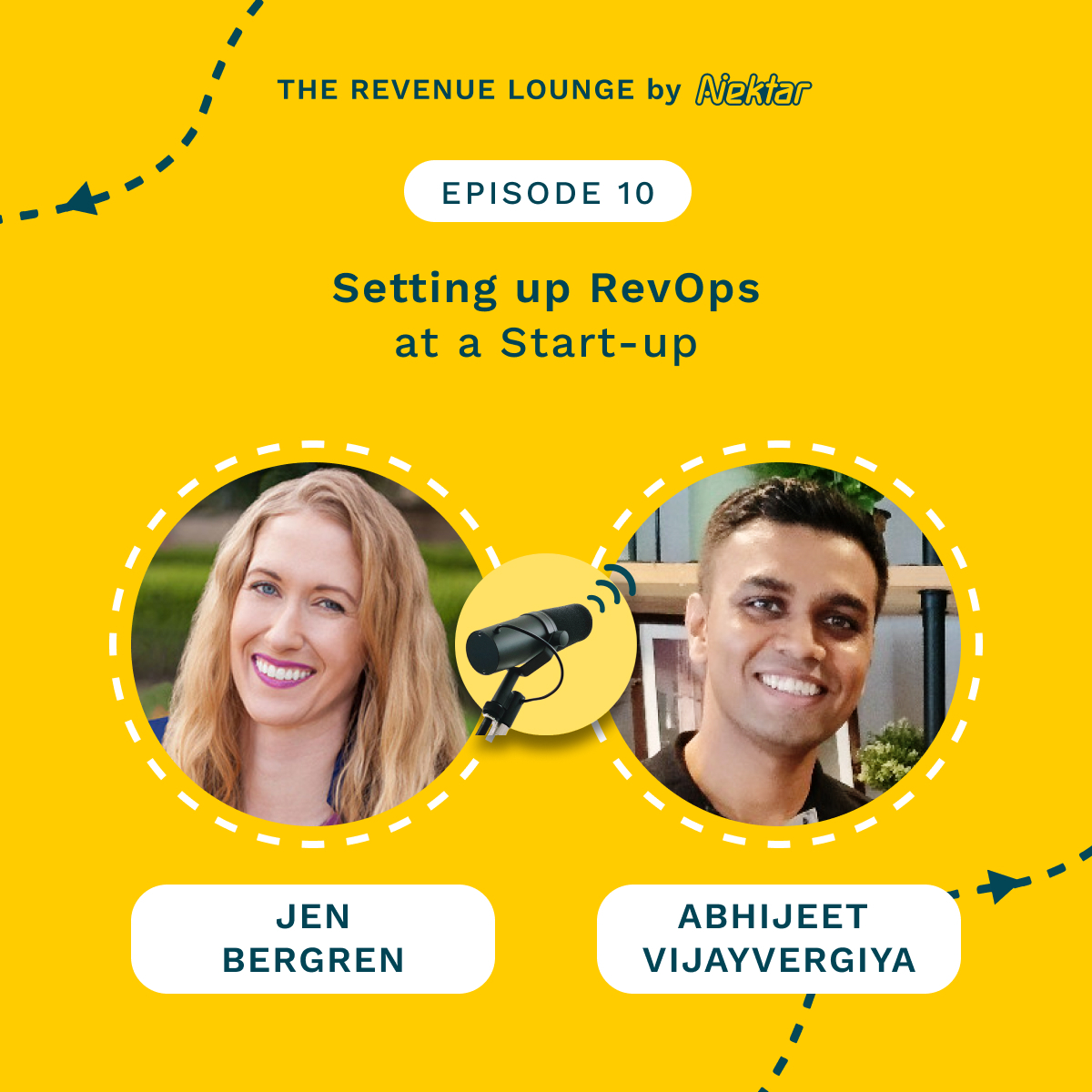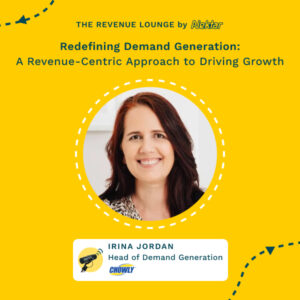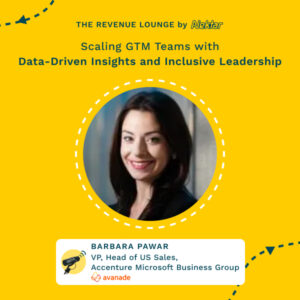Ep #10: Using Customer Data to Drive Efficient Revenue Growth ft. Mollie Bodensteiner
June 7, 2023
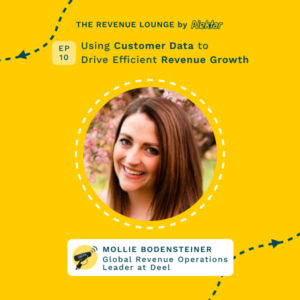
About
The Revenue Lounge
The podcast covers stories from leaders across RevOps, Sales, Customer Success, GTM, Data and Marketing about what drives these functions and what advice they would share with our listeners. With 3 seasons recorded, the podcast currently features 50+ enterprise leaders in the B2B SaaS domain. Tune in to hear from the best in the business
Welcome to Season 2 Episode 10 of The Revenue Lounge Podcast by Nektar.ai – A series of interviews with top Revenue Operations leaders on what drives the function and what keeps them going!
Episode Guest – Mollie Bodensteiner
https://www.linkedin.com/in/molliebodensteiner/
Episode Host – Bhaswati B
https://www.linkedin.com/in/bhaswati-bhattacharyya-9307768b/
Podcast Details:
Podcast page – https://nektar.ai/podcasts/
Spotify – https://open.spotify.com/show/3DUOqnTpPOJ2xbyl7HdgN3
Google Podcasts – https://podcasts.google.com/u/0/search/the%20revenue%20lounge
Apple Podcasts – https://podcasts.apple.com/in/podcast/the-revenue-lounge/id1645044872
Episode Details:
Revenue leaders have been asked to drive efficient and effective revenue growth in the current economic environment. And to be able to reach this goal requires an uncontested access to all the customer data that companies have.
First-party customer data, if captured in a complete and accurate manner, and kept updated with automations – can grant powerful insights to revenue teams to increase pipeline.
Unfortunately, most organizations don’t have access to clean, complete and updated customer data in core systems like CRM. They are drawing insights from data that is getting stale at rocket speed, is incorrectly entered, or incomplete. As a result – they miss out on countless revenue opportunities.
This is where the role of RevOps becomes crucial. They can not only identify these data gaps, but also install processes and tools in place that can help systems like CRM capture customer data in a complete and accurate manner.
Let’s learn more about the importance of customer data and how RevOps can play a role in leveraging powerful insights from it from today’s guest. Mollie Bodensteiner!
Mollie is the Global Revenue Operations Leader at Deel. She is a RevOps leader with a demonstrated history of leveraging data to produce efficient results. She is passionate about utilizing technology to drive performance and innovation.
Want to learn more about Nektar?
Talk to our team – https://bit.ly/3MishjZ
#customerdata

Hello everyone. Welcome to the Revenue Lounge Podcast. I’m Bhaswati, and in today’s episode, we will be talking about how to use customer data to drive revenue growth. As we all know, revenue leaders have been asked to drive efficient and effective revenue growth in the current economic environment.
[00:00:46] And to be able to reach this goal requires an uncontested access to all the customer data that companies have. First party customer data, if captured in a complete and accurate manner, and kept updated with automations can grant powerful insights to revenue teams to increase pipeline. Unfortunately, most organizations don’t have access to clean, complete, and updated customer data.
[00:01:10] in core systems like CRM, they are drawing insights from data that is probably getting stale at rocket speed is incorrectly entered or incomplete. As a result, they miss out on countless revenue opportunities. This is where the role of rev ops becomes crucial. They can not only identify these data gaps. But also install processes and tools in place that can help systems like CRM, capture customer data.
[00:01:35] In a complete and accurate manner. Let’s learn more about the importance of customer data and how Rev Ops can play a role in leveraging powerful insights. From it, from today’s guest, it’s a pleasure to have Molly Bodensteiner with us today. Molly is the Global Revenue Operations leader at deal. She’s a rev ops leader with a demonstrated history of leveraging data to produce efficient results, and she’s passionate about utilizing technology to drive performance and [00:02:00] innovation among many other things.
[00:02:01] Hi, Molly. Thank you so much for joining us today. Hi. Thanks for having me. I love that we’re talking about this, right? Because I do think that the way we’ve historically talked about data as organizations has continued to evolve and will continue to evolve, and I’m, you know, very passionate that as an organization, regardless of if you’re in rev ops as a business, right?
[00:02:21] Data is such a viable asset to your growth. And when leveraged properly, when managed properly, it’s, it’s a game changer. It’s what sets what I consider, you know, successful companies versus mediocre companies. Apart. So really excited to share more about how that fits within Rev ops and overall organizational structures.
[00:02:38] We can start by you telling us a little bit about your current role at Deal. Yeah, absolutely. So I’ve been with Deel just a little under a year now, and anyone who’s familiar with Deel, Deel is a very, very, very, very fast paced startup. We. Talk about unicorns, probably even, whatever the next thing is from a unicorn, have really achieved hypergrowth over the last three years as an organization.
[00:02:59] [00:03:00] And so I joined again about a year ago, and really my focus has been how do I improve processing systems under our revenue operations teams? So when we think about sitting under revenue operations, we’re all, you know, very familiar with the function of revenue operations. You’ve got your sales ops, your marketing ops, what I consider kind of your functional operations.
[00:03:18] You’ve got your tech and tooling, you’ve got your processes, you’ve got your data and analytics right? And comes together, kind of makes that full circle team. So while I’m a part of the revenue operations team, I spend the vast majority of my time really focused on our processes. And when we talk through processes, I talk about how do we drive the customer experience and the seller experience.
[00:03:36] And when we talk sellers, Anyone who’s interacting with customers, helping to support the revenue process to be more efficient, more effective, and deliver better business results. And then the second part of that is how do I use the right data and the right technology to support those processes and then turn those people?
[00:03:52] Yeah, that sounds like a very detailed approach to revenue operations. Like you spoke about processes, you spoke about data, and you spoke about technology. [00:04:00] So very excited to dive into probably each of that. So, How do you define revenue operations? Yeah. Yes. And I love this question as I’ve commonly joked that like the tagline for revenue operations is, it depends, right?
[00:04:12] So the way that I define revenue operations is very dependent on, you know, at the detailed level of the organization that I’m working in, the maturity model. Instead, when I think about what is the goal of revenue operations, right? Is, how do you provide the right visibility across the revenue operations?
[00:04:29] Revenue, revenue teams, right? Delivering the visibility across the revenue op teams. That improves efficiency across the entire revenue process. You’re driving predictability and you’re creating a more consistent experience. For your customers, for your sellers, you know, really managing that. When I think about the team, it’s the team that’s focused on the people, the process, the data, the technology across marketing, sales, customer success, finance, product development across the customer lifecycle.
[00:04:57] And I could sit here and give like a fluffy, like this is what [00:05:00] revenue operations is and what it isn’t, but it, each business is gonna have different needs, right? If you’re a 50 person company, your revenue operations. Function really might be centered around getting your backend infrastructure set up for C R M, right?
[00:05:13] And supporting the scaling there and the revenue process. As you continue to grow and you become a larger, more mature organization, you’re gonna have additional pillars of operations come into there. So what I try to do is take a step back and I hate the word revenue and revenue operations for the sheer fact that it generally sways to sales operations.
[00:05:30] And we think about it in terms of, you know, comp quota, commission, that stuff, right? Instead, I think it’s really looking at the experience. And the more you can drive the experience from a customer standpoint and delighting, making things efficient, understanding, you know, how do I best service my customers and aligning the sales.
[00:05:49] And the seller motion. Right? And when I say seller, that’s still marketing. That’s still cs, that’s sales, that’s SDRs. That’s anyone a part of the revenue organization who’s ultimately accountable for that [00:06:00] experience to delight the customers, to have the right information they need to make the best business decisions.
[00:06:04] Like that to me is what is revenue operation? It’s the experience and making sure you have the best experience through the people, the process, the data, and the technology. Love that. That’s a brilliant way to look at revenue operations. So moving on to the next question, another fascinating thing about, you know, rev ops leaders that we speak to at Nectar is the journey that they undertook to get into this space.
[00:06:25] And usually we have some amazing answers. So would love to know your journey there too. Like how did you get into Rev op and, and what’s your story? Yeah, so I would joke and I’d say I was in revenue operations before it was cool, right? And before it’s a thing. And I think I’ve been fortunate enough with my career that.
[00:06:41] When I think about why I’m so naturally gravitated and attracted to revenue operations, it’s the efficiency, right? Natural problem solving, making things better, that improvement. And early in my career, I actually was building databases. So that was an internship I had outta college. It was taking a business problem and building an actual homegrown solution.
[00:06:59] And I’m [00:07:00] like not to age myself like this was before CRM was cool and Salesforce was like the hot thing, right? And so having the opportunity to say, how do I fix a business problem with technology and improve a process with technology was something I was able to start doing before I had even graduated college.
[00:07:16] And then was fortunate enough to continue to grow within that organization, but also move to other organizations where I was consistently in an operations function. Whether I was in marketing, operations, partner operations, sales operations, I was always in an operating type role. And did you know a lot of consulting with other companies during my time with Marketo and other organizations, which.
[00:07:39] I loved because it’s, what are people doing? Everyone is so different. So how do you take a problem and build the right solution for the business? There’s no one size fits all solution to anything, and I think that’s what’s so appealing about revenue operations. My first official role in a revenue operations org though was only four or five years ago, and I’d say that was even still cutting edge for what we’re doing on the industry.
[00:07:59] And [00:08:00] so since then I’ve had the opportunity to be a leader in four different. Companies leading revenue operations teams in some way, shape, or form, and it’s been really fun. I think one of my favorite things about this is really like helping develop the talent in this, right? We always used to joke with marketing operations, right?
[00:08:16] They don’t teach this in college, right? There’s, you don’t go to college and say, I’m gonna be. A Salesforce administrator and that’s what I’m gonna do. So really being able to take and help shape career paths. And this isn’t a linear career path, right? I think I’m one of the few people who have started my career in this and kind of had this in my back pocket.
[00:08:33] But I love seeing like salespeople move into operations, marketers move into operations. Finance people move into operations, right? Because it’s an experience driven problem solving, like value add. Function that like that diversity and that knowledge is so huge. Yeah. Sounds like you were kind of destined to land up in operations.
[00:08:51] I joke because I’m like, oh, now there’s actually like a job title for what I feel like I had been doing at all these companies over the years. Right. Like, oh, there’s actually a [00:09:00] name for what I’m doing. Yeah. Finally a long deal. So a lot has changed for revenue leaders in the last. One year. The market has been unforgiving in a lot of ways, and the uncertainty in the market has changed a lot of priorities for business leaders.
[00:09:13] Right. So given all of that that is currently out there, I just wanted to know, in your opinion, what is your biggest challenge today as a Revs professional that you face? Yeah, so we’ve had a whirlwind the last 18 months or so, right? Like we saw everything go sky high to starting to creep down. And so I think one of the big things that I think about here is, and the common trend, and I hate it, it’s to do more with less, right?
[00:09:36] So as you think about the challenges that face revenue operations professionals today, it’s how do you do more with less, right? And defining what less means. And being smart about that in terms of the business trade off, right? So if you’re getting asked to cut cost, where do you cut those costs and what those trade-offs are, right?
[00:09:52] Are you automating through a tool? Are you getting rid of technology? Are you cutting headcount? Like what does that mean to actually do [00:10:00] more with less and be more efficient? Generally, revenue operations teams, in my mind, typically don’t have a lot of facts to them. They’re generally pretty lean, doing a lot, very clear roles and responsibilities.
[00:10:12] And when I say clear roles and responsibilities, it’s probably better to say there’s a lot on their plates or that they’re doing it at any time. But it’s how do you operationalize that and how do you scale that? So we spend a lot of time as ops professionals looking at our stakeholders processes, right?
[00:10:26] How do I make sales more efficient? How do I make sales more effective? How do I save. Time for sales. How do I improve productivity for sales or marketing or whatever team, like taking a step back and saying, let’s do that with our own, or, right. So how do you take that experience that you have and apply it to your own business unit, right?
[00:10:42] And say, how do I make revenue operations more efficient? How do I make us more effective? How do I streamline our intake process? How do I get better prioritization? Like those are the things that I look at as, you know, almost our own shortcomings being not reflective enough internally. And building those improvements.
[00:10:58] And that’s how you’re gonna figure out how [00:11:00] you can do more with less. I hate saying that, but it’s how do you improve your own processes? Yeah. Got it. So providing the customers a seamless experience throughout the customer journey is what will help businesses continue to evolve in such challenging times that we are in.
[00:11:15] So what’s your perspective, you know, as of today, how crucial is customer data in driving this efficient and effective revenue growth and this whole do more with less mantra that everybody’s. Something about, yeah, so the best example I have on this is like, put yourself in as your consumer, right? So you know, I have a Peloton love writing my Peloton, and if something breaks on it, And I’m unhappy with that experience.
[00:11:40] I have a support ticket open. I need my pedal fixed, something like that. Like I’m gonna file a support ticket. I’m gonna go through that experience. Like the last thing I want is like an email from Peloton that’s buy more, do this. Right? We’ve gotta think about the experience and that’s where data drives that, right?
[00:11:53] And that’s where, as consumers, we expect the products that we use, the services that we use to have all this [00:12:00] data because they do. Right? And if they don’t, something critical is missing, but they have this data. You can’t tell me they don’t, whether they have it centralized, whether they have it unified and whether they have it actionable.
[00:12:10] Completely different topic, but they have the data. I mean, it data is an output of process. If you’re using the process, there is data, whether it’s good data or bad data, hard to say. But as consumers, we expect that and we expect that experience. I expect that if I call into the pharmacy to get a prescription refill, I.
[00:12:30] They know what prescription I’m gonna need refilled. They have that information. It sits there. That drives the experience, right? Could you imagine calling in a pharmacy and they’re like, oh, we have no idea what you’re talking about. Well, I’ve been a customer for 10 years and had this prescription for 10 years.
[00:12:44] Why is that different in SaaS? Right? And why is that different in tech? And I think some of that goes down to like, we have not successfully really built actionability off of our data, against the experience and taking that step back and understanding the experience. And again, it’s like how do we produce more revenue while we delight our customers?[00:13:00]
[00:13:00] How do we delight our customers? We have the experience that they expect. How do we build the experience we expect? We align it with data, and I can chicken and egg this all day long, but it’s how do you build that right experience and build those interactions and manage the bad interactions too. Right?
[00:13:13] And I think that’s where a lot of customers go wrong, is they don’t use the data from the support team, from the CS from. Those components to really produce next best action. It doesn’t mean the next best action is revenue generating. It means the next best action meets the needs of the customer and anticipates their needs, solves the problem, and keeps the owners all aligned.
[00:13:34] Got it. Yeah. So like you said, the data’s always there. It’s just that the actionability and the plan around it is probably missing. Yeah. So, So I would like to ask you, what’s the cause of that? And secondly, what are the challenges that Rev ops professionals face in accessing this data? What’s preventing them from accessing clean and complete customer data in, let’s say, systems like C R M?
[00:13:56] Yeah, so I think a lot of the challenges with accessing the data is it’s [00:14:00] disparate. So when you think about all the different sources you’re probably storing customer data in, it requires that you actually have a strategy of this. And we talk about like single source of truth of data. In my mind, that’s not as important, right?
[00:14:11] It’s more having like a clear distributed. Source of truth of data and making sure like you have the right data at the right time for the right need. I don’t need us to have fully centralized up-to-date unified data at any given time. That’s not possible, right? No business has that data’s fluid. It’s changing.
[00:14:27] It’s more making sure that where your users are working in the data that they need to make decisions and build a customer interaction has that complete. Accurate, necessary data, and for so long everything was like bi visualization. Let’s build these great dashboards, right? Dashboards aren’t actionable.
[00:14:43] Dashboards drive strategy. They drive direction. They don’t drive interaction. And so how do you take interacting data and actually surface that back up? So when I’m in c R M and I’m looking at, you know, customer A, B, C, I can see that they have a P one ticket open with our [00:15:00] support team, and the sentiment is red and like my next interaction shouldn’t be, Hey, you wanna buy more?
[00:15:06] It should be, Hey, how’s everything going? I see you’ve got a ticket open. As your account manager, I just wanna make sure you know that I’m here to help support you. Like I know I’ve been talking to the support team, but let me know what I can do to help. Like that type of interaction is how you build relationships, how you build trust, how you build credibility and compassion within your customers.
[00:15:24] And that’s the information that you need to build that next action. And. Do that. And that’s where I think we focus on the aggregation and not as much of like the actionability when we think about using data. Got it. Yeah. So wrong kind of communication sounds like a common mistake, right? That we’ve all faced as customers and we’ve probably all made as part of revenue operations team.
[00:15:45] So in your experience, apart from this, like what could be some of the common mistakes that Rev op teams make when working with customer data and how can they avoid. Some of them. Yeah. Yeah. I’m gonna broaden this to not just be rev ops, right? I think that this is a [00:16:00] mistake that a lot of just companies in general make is not having a data strategy, right?
[00:16:04] Having a clear data governance model, data definition. You know, when I get on a call with the C R O or CMO and I say, customer, we should all be speaking that same language, right? Because if we’re not, and we don’t have clear definitions aligned and defined, like we’re gonna make assumptions. And making assumptions is gonna sway results, sway outcomes, sway decisions.
[00:16:25] So having a really clear data dictionary, key definitions, foundational level metrics define that you’re building off of. And slicing and dicing through is critical for this. And then also, whenever I work on building any sort of report or looking at any metric, I ask, what’s the business decision you’re gonna make off of this?
[00:16:41] Right? So if I give you this field, What are you gonna do with it? How does this impact the customer journey? How are you gonna use that? And really probing on that with stakeholders versus, you know, rev lobsters. I, I’m gonna knock on us a bit, guys don’t come at me on social media things, but we’re generally order takers, right?
[00:16:56] And a lot of that’s because we’re so underwater. We’re getting hit with so many [00:17:00] requests and somebody’s like, just build a field and we just build the field. But again, how does that fit into the process? How does this drive value to the customer? Like what does this do is gonna change the perspective of do I build a field or am I building an actual workflow that’s managing an experience that’s driving the business forward?
[00:17:17] And those are the conversations we’ve gotta start having as we think more strategically around the experience and more holistically. Around this. So I think like mistakes that we make are, we don’t have a good data strategy, right? Data authority, data management, even simple things like data normalization, right?
[00:17:33] And thinking about if I capture a pick list value in Zendesk that doesn’t align to alas value in Salesforce and I wanna merge that data together, what does that mean? That’s a pain, right? And that’s just foundational, like very simple things that can slow the momentum, skew the results, and impact the business, but having that alignment, no one owns data, right?
[00:17:53] Everyone owns pieces of data and parts of data in an organization. But getting that general group together of like, all right, what’s [00:18:00] our data strategy? What’s our normalization guidelines? How are we gonna standardize? How do we define, and then how do we build action off of this, I think, is so critical and a part that generally, I don’t think we do a very good job of.
[00:18:12] And I think that’s a really big opportunity for us to start supporting. Yeah. Yeah. So I think whatever you mentioned, this is in alignment with a lot of rev ops leaders that we’ve spoken to in the past. The importance of having this. Solid data governance strategy in place. Thank you for sharing that. So now that we’ve spoken about the data governance strategy, we have to come towards the tech stack to enable all of this, right?
[00:18:34] So what kind of tools and technologies can rev op use to access and maintain clean customer data? Yeah, absolutely. So when we think about the people, the process, the data, and the technology, it’s important to remember that data is an output of process. So whatever your process is that you’re building is producing data.
[00:18:53] And then technology is the support function that helps to streamline the process and gather the data and [00:19:00] support the data needs. So it’s really important that when you’re thinking about the technology need, you have the clear process to find the data that you need to capture and how you need to manage it.
[00:19:07] And then the technology is, Subsidizing that versus your process is working for technology. And I see that happen a lot, right? We buy technology and we work for technology versus we have the process and we find the tool to support the process. So I think there’s no right or wrong answer when it comes to your tech stack, because it’s dependent on your business, right?
[00:19:26] But making sure you have a way to capture that information. And you might be a two person company and you might need to use a Google sheet. And that’s okay if the Google sheet becomes your c R m. As long as you have structure and you have standard, and you have governance, and you have a process, like that’s okay.
[00:19:42] Until you scale and need something more, it goes back to the process and the data that you need from that and making sure you’re capturing that. Now, the issue is you’re a two person company and you have. You’re two salespeople working in two different spreadsheets, capturing 12 different pieces of information each, where you start to have the problems.
[00:19:58] So thinking about your [00:20:00] capture strategy and what’s the information you need, what decisions that’s going to drive, how you’re going to use it, and then also where does it need to go, right? Because not every, so I think a lot about product data. Product data in intuitively is not sourced out of C R M. It should be coming into CRM if we’re gonna use it to make decisions or drive pieces.
[00:20:17] But I don’t need every single attribute from my product into Salesforce, right? Salesforce is not a data warehouse. Salesforce is not data storage, right? Salesforce is an enablement of the experience. So how do you make sure you bring the right data in at the right time to deliver the experience? And so when I think about generally what you need in a tech stack, you likely are gonna need some sort of CRM, right?
[00:20:40] Some way, place that you’re gonna action and manage. The customer experience. You’re then also looking at where am I gonna store all my data, right? So what becomes my library of data? Whether that’s using a big query data, warehouse data, like, you know, putting something in place so that you have that repository of data that you need that’s a little bit raw to use, but [00:21:00] where are you at least capturing?
[00:21:01] So that you can determine kind of distribution and centralization and then you’re likely gonna need something to help move data, right? That’s the data engineering component of how do I get it from point A to point B, whether that’s native integrations, whether that’s using a middleware connector, but something that’s helping you push data where it needs to go when you need it in the right way.
[00:21:20] So those, like when I think about the data tech stack, like that’s generally. Kind of the three components that you need, but without having a strategy and without having governance and without having definition, it’s not gonna be good. So make sure you have those things first. So get the strategy right, get the process defined, understand the data you need, and then build the infrastructure to support it.
[00:21:39] Got it. Awesome. Since we are talking about the data governance strategy, and you also mentioned that data should be looked at and understood the same way by all revenue generating teams, which means that everybody should be aligned. Towards similar revenue goals. So I just wanted to understand from your perspective, like how do you create that kind of collaborative environment and a culture driven [00:22:00] by robust communication to ensure that.
[00:22:02] Revenue teams are on the same page when it comes to data. Yeah, absolutely. So when you think about this, right, you said the word, it’s alignment, right? And and alignment is hard because it takes work. And I think because of lack of authority and ownership of a data strategy in most organizations, You’re at the mercy of building alignment and it needs to start at the top, right?
[00:22:22] It’s something that’s gotta come down from the top of, you know, here’s how we run our business, here’s how we measure our business, here’s how we use data as an organization, and this is what this means to each of these functions, right? We’ve come a long ways from marketing, just having MQL goals and sales, having revenue goals.
[00:22:36] We’re starting to look across the experience. We’re looking at key metrics like net dollar retention and expansion, and we’re getting past just the net new logo piece, right? You know, product led growth, lots of different things. Coming into the market as trends and you’ve gotta understand like what, what the KPIs that each team plays in influencing that and moving that forward and what data they need to drive that, and what decisions they need to make and how you define [00:23:00] success.
[00:23:00] And I think a lot of times we don’t define success clear enough in terms of what our expectations are at a secondary metric level, right? We look at it as like, I want a million dollars in revenue. What are leading indicators to get us there? What are the things that we should look at and set goals around so that we know before the end of the quarter where we’re gonna be right?
[00:23:20] And start having more of like the predictability of those so we can turn the levers, turn the dials, run the experiments, and do the things that we can measure against that. Tell the story of how we get there. And help write the story more than anything. Perfect. So moving on to the last question of this section.
[00:23:36] There are so many compliance issues when it comes to data usage, right? So what are some of the ethical considerations that Rev ops professionals should be aware of when they are working with customer data? Yeah, absolutely. So working closely with your chief data privacy officer and your privacy team to make sure you have.
[00:23:53] Clear understanding of the laws and the regulations around the data is first and foremost, right? You wanna make sure that you are in [00:24:00] compliance and adherence on based on the necessary responsibility of processing, of managing, of storing customer data. The other thing on top of that is I think about what would I want, you know, empathy is always a good thing, right?
[00:24:12] So first step is make sure you’re legally complying and working. Obviously we’re not lawyers, right? We’re, we didn’t go to law school. Goal to be rev op professionals. So make sure you’re using the resources within your organization to really drive that strategy and drive those requirements. And then I generally think through human nature, right?
[00:24:27] Like, how do I feel about my data? Is this something that I would feel comfortable with if I knew a company was doing that? And run it through your own moral compass, rule of thumb too, and try to make those decisions. And if you don’t have a great moral compass, maybe don’t run it through yours and run it through somebody else’s.
[00:24:41] But just trying to be, at the end of the day, a good human, a good steward of your customer data like. A good example is if this got blasted on Twitter, would you be proud of this? Would this be an issue? And so thinking through those types of things I think helps kind of as that rule of thumb of, you know, did it, am I making the best choices for the [00:25:00] business?
[00:25:00] Am I doing right? But again, the first step is being in compliance. Make sure you’re following legal regulation that goes back to like the data authority, the data strategy, the data governance, and making sure those components are part of that in terms of like your DPO regulations. Makes sense. Yeah.
[00:25:14] Thanks for sharing that. So yeah, that. Brings us to the end of the first section. So we’ll move to the second section of the podcast going, which is the rapid fire round. We ask our guests a series of questions with the intention of getting to know you better besides only RevOps. So my first question is, what’s one book that you have loved in the recent past?
[00:25:33] That you would recommend? Yeah, so Crucial Conversations is a book that I read quite a bit. I generally read this probably at least twice a year and have for a really long time. If you’re not familiar with it, highly recommend audiobook version of it because there’s so many different scenario casts. But it’s really, as you’re having very important business conversations or even personal conversations, like how do you focus on the right outcome?
[00:25:57] How do you make sure that you’re creating a safe environment and. Getting [00:26:00] value outta conversations. And I think like as you know, the world of Covid as we’ve went more, more remote deal is a hundred percent remote. Like being able to have those conversations virtually adds like a whole other level of complexity.
[00:26:12] To things. So how do you make sure like you can have tough conversations, get the right outcomes, and do it in a professional and a positive and a meaningful way? Great book for anyone who’s even starting their career or have been in their career. Like I said, I’d listened to it probably more than I should, but it’s always a really good refresher.
[00:26:28] So that is definitely one that I enjoy. Predictable Success is another one that I just recently. Finished up that talks through the journey and the stages of evolution as you’re growing a business and like what to expect and just is really good refresher. I think a lot of the stuff is intuitive, but until you hear somebody say it a few times and then it starts to like actually click and make sense.
[00:26:46] So those are fun ones. A personal book that I like is tiny, beautiful things. So Lady Who Wrote Wild It. Just a good soft read if anyone’s like. I don’t wanna read a business book that I can also recommend there. Yeah, [00:27:00] we love all kinds of recommendations. Thank you for sharing three recommendations. We are definitely going to check all of them out.
[00:27:06] So next question is, what’s your favorite part about working in ops? Yeah, I’m gonna say two. So I think one of my favorite parts is the problem solving, right? So like the fact that every day there’s a new problem, there’s something new to address. Even if you’re the most stable, productive, best organization in the world, there’s always room for improvement.
[00:27:23] And the ops gives you the power to really look at the problem, diagnose the problem, and put a plate in place for improvement and deliver on that. I think the other part of my favorite part about operations, you know, as I’ve been building out teams and mentoring and growing is like really helping develop.
[00:27:38] People as they either make career moves into revenue operations or are further growing their career in revenue operations, because there’s so much flexibility, right? It’s not just that you come in and you’re this like specialist of revenue ops, right? There’s so many different ways you can specialize things you can further expand in and have that diversification.
[00:27:55] So I’ve really enjoyed helping people grow in their career, mentor them, give them the [00:28:00] opportunity to, you know, Take like a Salesforce developer who sits under Rev ops, right? If they sit under rev ops and not it, they have this opportunity to learn the business more. They’re getting the ability to work on different types of projects, right?
[00:28:11] They’re not just getting these Jira tickets and execute and design the solution, right? They get to be a part of kind of the sausage making and a part of that, and I think it starts to open up other opportunities and learning and growing, and that’s probably one of my favorite things about this is while we have roles and responsibilities, Because of the fact that there’s always so much to do, you get a lot of cross-training and you get a lot of opportunity shift and learn and help out and grow in ways that you maybe wouldn’t grow in necessarily in a more standard type of function.
[00:28:40] Right. Love that. So we’ve spoken about the favorite parts. So going to the, I know what’s gonna come next to a more controversial part of it, like your least favorite part about working in. Yeah, I think one of my least favorite parts, and this is I think a lot of people will empathize with this, is that, and I don’t wanna say reactive, right?
[00:28:58] There’s always work to do. There’s always [00:29:00] problems to solve, there’s always fire drills. And one of the things that I really have to focus on professionally, and I wish I had more time and space, right? So if I can actually get out of the day to day and get out of the executionary pieces and. Think through the bigger initiatives and the bigger problems, right?
[00:29:16] Like it’s carving that time and space out to really do the bigger things. And when I say bigger things, it’s not to say the things that we do on a day to day aren’t big, right? It’s just. Getting that step up and taking that breath and being able to look and see, right? And when you sit in the day to day and you sit in the execution and you sit in like the working to get stuff done, you sometimes miss the forest through the trees.
[00:29:36] And so I think it’s important that you can k kind of take that step back. And so I’m really trying to be more purposeful about carving that time out every week to say, this is my think time. I don’t have a firm agenda. I don’t have something I’m really trying to do, but I’m gonna try to take a problem or something that I’ve seen that week and really hone in on it and see how I can drive the business forward.
[00:29:56] Yeah. Yeah. So this whole debate about, you know, strategic versus [00:30:00] tactical is something that a lot of our guests have highlighted just like you did right now, and that I think remains like a struggle for Rev. We will Thank you for sharing that. Now my next question in the rapid fire round is, Who is one Rev ops leader that you personally look up to and why?
[00:30:14] Oh, I think there’s tons, right? I look up to almost like anyone in the Rev Genius community is great out there. There’s so many good communities out there, Rosalyn and Jeff, and there’s tons, right? Like I look at Chili Piper’s top 32 that they ran earlier, those this year, and I’m like, yeah, every one of those people are people that I look up to and I look to for advice, right?
[00:30:34] This isn’t an organizational function that like we all. Come in and we’ve had these great, you know, I look at like AEs, right? You take a career path of an AE man. You’ve got these great sales leaders that you’re working for, and every company you go to, you know there’s gonna be a sales leader, right? Like for a lot of us, we’re either first time in running revenue operations team, first time rule in revenue operations.
[00:30:54] We’re defining a lot as we go. We don’t have peers. Right, like there’s generally not been a peer environment. So this [00:31:00] community in this network has become our peers. And I think, you know, Jared with Rev Genius has done a great job of building out that community. Even two years ago, communities were just starting to be a thing.
[00:31:10] And so I, I don’t know that there’s one necessarily. Specific Rev op Looter. I think I, I lean a lot on my network and I lean a lot on people just based on their specific experience too and where I’m looking to grow and develop. I completely agree with you. I think the Rev ops community is of a special kind and they’re always looking out for each other and learning from each other, and there’s so much to learn from these communities, so many people to be inspired by every day.
[00:31:35] My next question is an advice that you’ve received from someone that has stayed with you in your life, helped you probably go through some tough times that you would like to share with. Yes. Yeah. Yeah. So I think it’s, Mr. Rogers has probably gave us advice about just be kind. You know, the thing that I think a lot about is like clear is kind, and I think it’s important, especially when we’re in roles where we are asked to do a lot, there’s a lot going on.
[00:31:58] I’m a natural people [00:32:00] pleaser. Like I love saying yes, I love making people happy, I love delivering good work. But you’ve gotta not do that at the sacrifice of your own wellbeing and your own health and your family, and those. Things. So being really clear and purposeful on your prioritization, your capacity, your needs are really important.
[00:32:16] The thing that I instruct my team on, and I make them push and challenge me, is I expect my team to be at capacity, right? I expect them to have a full day of work when they come in. We have the work to do. On the flip side of that is that if I ask them to do something, I expect them to tell me what’s not gonna get done or make me make a trade off, right?
[00:32:34] And that’s the way that I want leadership to realize in those things too, right? If you’re running a. Best in class operations team that’s efficient and effective. We’re not sitting on your hands. So let’s make trade offs. Let’s make sure we have aligned roadmaps. Let’s be really clear. Um, the worst thing you can do is like start in a project That take is taking thought, taking development, taking work, and shift a goalpost when you’re almost there.
[00:32:56] Because you either pause the project and then have to come back and [00:33:00] pick it all up and start over. Or you potentially are just gonna waste time in making decisions and go through kind of just the fatigue cycle. So my big advice is clear as kind, unclear is unkind. So I’d rather be the person who says no directly, no is a full sentence.
[00:33:17] And I remind myself of that a lot, but no, I can’t do that because of X, Y, and Z is clear versus, yeah, maybe, let me think about it, right? So make sure you’re holding yourself accountable for your actions and your commitments to the business versus. Piling it on and burning yourself out cuz then you’re not gonna be as productive and not as meaningful and not as satisfied.
[00:33:37] Right. The happier people they are at their job, the better where their work is. Yeah, I love that. I think I’m also going to take that advice and apply it to my own, uh, work life as well. Thank you for that. Last question that I have for you is, you know, rev ops is coming up as. A very popular job role and head of rev ops was one of the most sought after roles.
[00:33:56] You must have seen that report from LinkedIn as well. There are a lot of [00:34:00] young newcomers who are probably wanting to join the field. So as someone who’s been in the space for so long, what advice would you give them as they begin their journey, or someone who. You have your job someday. Yeah, absolutely.
[00:34:13] It’s not as glamorous as everyone thinks, right? Like I think, you know, it’s the sexy job, right? But it’s hard work and it requires a lot of work. It’s a lot to understand, a lot to know and a lot to coordinate. You’re not just working in a single function, you’re generally working across, across the organization.
[00:34:29] Um, and not only doing tactical tooling, execution, but also high level strategies. So there’s a lot of components. That go into this work. And part of the thing that I would encourage people to do who are like, I really wanna grow my career in Rev is learn, right? Find good mentors, start to learn, start to ask the questions.
[00:34:46] Be really humble in what you’re doing. Operations and getting operations experience takes time, but you’re not gonna go to one company and. Have it all figured out because operations is a management of process and business processes are all different. [00:35:00] So be okay. Taking the step back and looking at the organization and the efficiency.
[00:35:04] It’s important to be an expert in the organization and expert in the process, but it’s also important to not be so ingrained in it that you can’t see its flaws. And that’s something that I try to remember a lot in rev ops is am I too vested in this? Am I too close to this that I can’t see what’s not working because I’ve been.
[00:35:21] Just sitting in it for so long. Right? So how do you take that and really make sure you keep that consultant or that external lens to make sure you’re always looking for improvement and looking for areas to grow and adjustments. The other thing, like I would say in terms of, I wanna get into Rev ops.
[00:35:38] That’s your point or your passion Again, join the communities. Start to identify mentors, ask questions, understand why Do you wanna get into rev ops? I think that’s a big piece. Is it that you’re passionate about improving business outcomes? Is that you wanna help support sales? Is it a financial component?
[00:35:53] From an analytics standpoint? What drives you? I think that’ll help narrow down the focus and the different [00:36:00] types of opportunities. You go into as you grow, and it’s not to say you can’t start in tech and tools and move into sales operations or cross functions, but be really purposeful about the type of function that you’re trying to get into and the why you’re trying to get into it.
[00:36:14] I joke when people are like, oh yeah, I want to move into RevOps for the money. Yeah, I mean, don’t. That’s probably not the right reason for it, but really think about that. And the other thing is think about your career experience, right? By understanding this, where does this take you? Right? What are the career opportunities that you’re looking for as you grow?
[00:36:31] As well. So like any role that you take should be your next step to get to your next role. So thinking about that and making sure you’re making those investments in your career and yourself are also super important. Yeah, that’s some brilliant advice for anybody who’s looking to get into the space or evolve or grow in this space.
[00:36:48] So thank you, Molly has been a great episode. Thank you so much. You have a great day ahead of you.
Yeah, thanks for having me. Take care.

Ep #1: Navigating the Downturn with a Hyperfocus on Productivity
Listen Now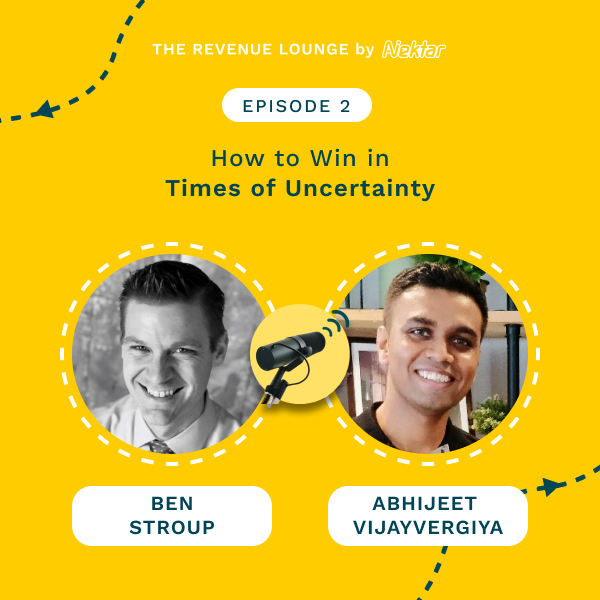
Ep #2: How to Win in Times of Uncertainty
Listen Now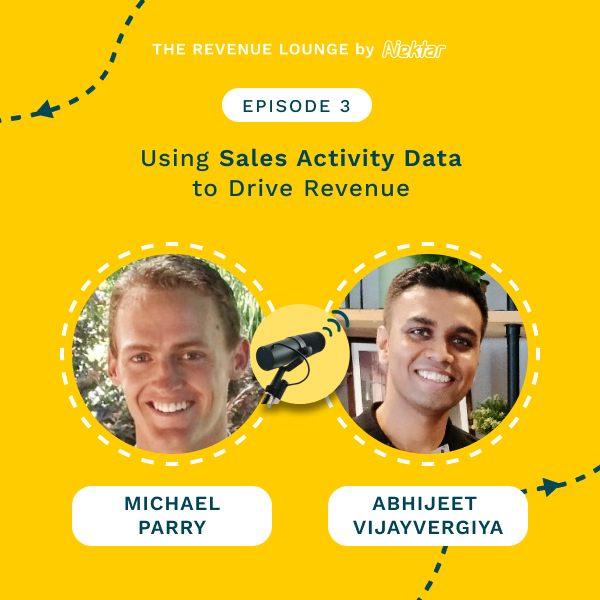
Ep #3: Using Activity Data to Drive Sales Productivity
Listen Now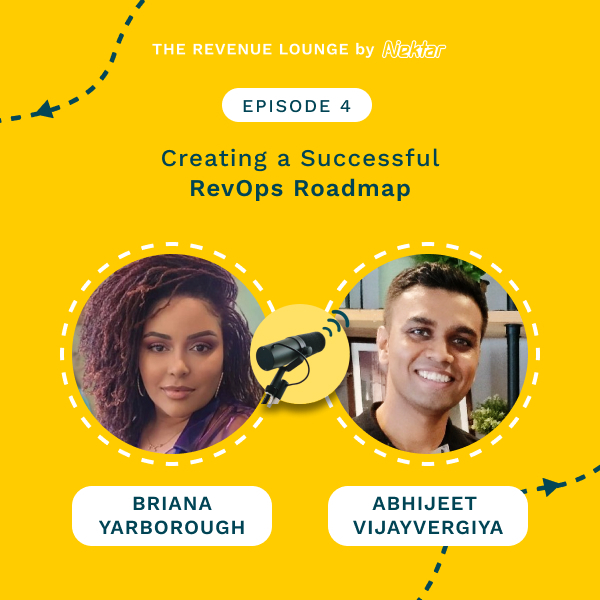
Ep #4: Creating a Successful RevOps Roadmap
Listen Now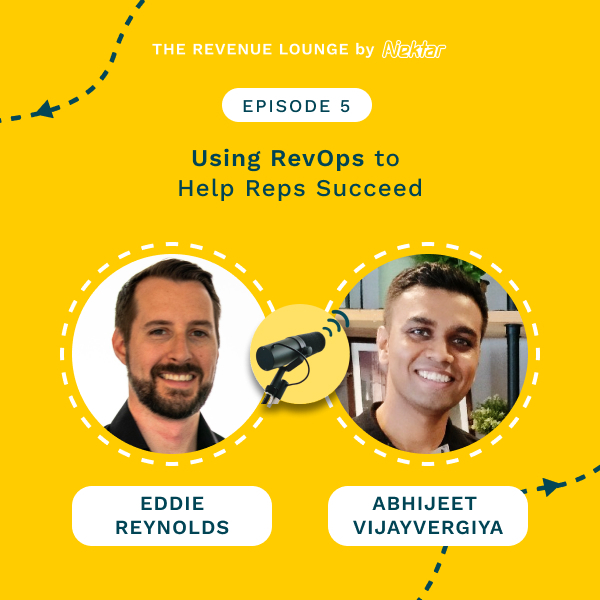
Ep #5: Using RevOps to Help Reps Succeed
Listen Now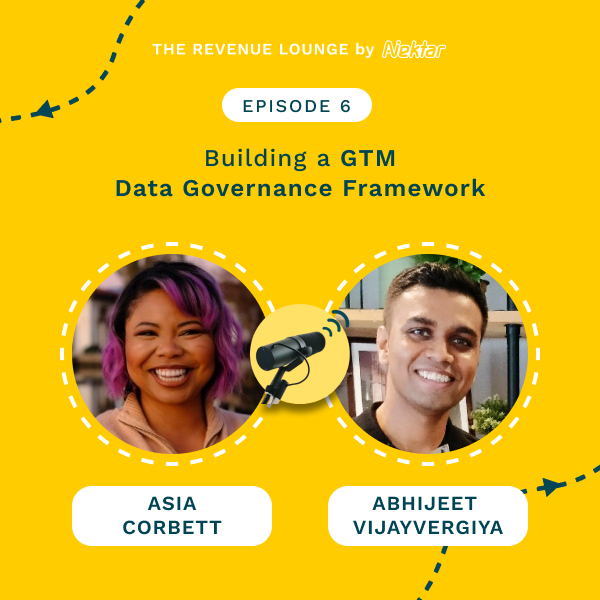
Ep #6: Building a GTM Data Governance Framework
Listen Now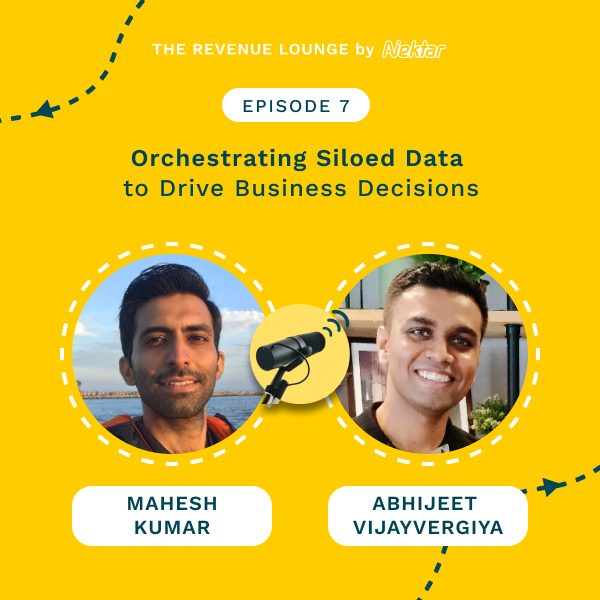
Ep #7: Orchestrating Siloed Data to Drive Business Decisions
Listen Now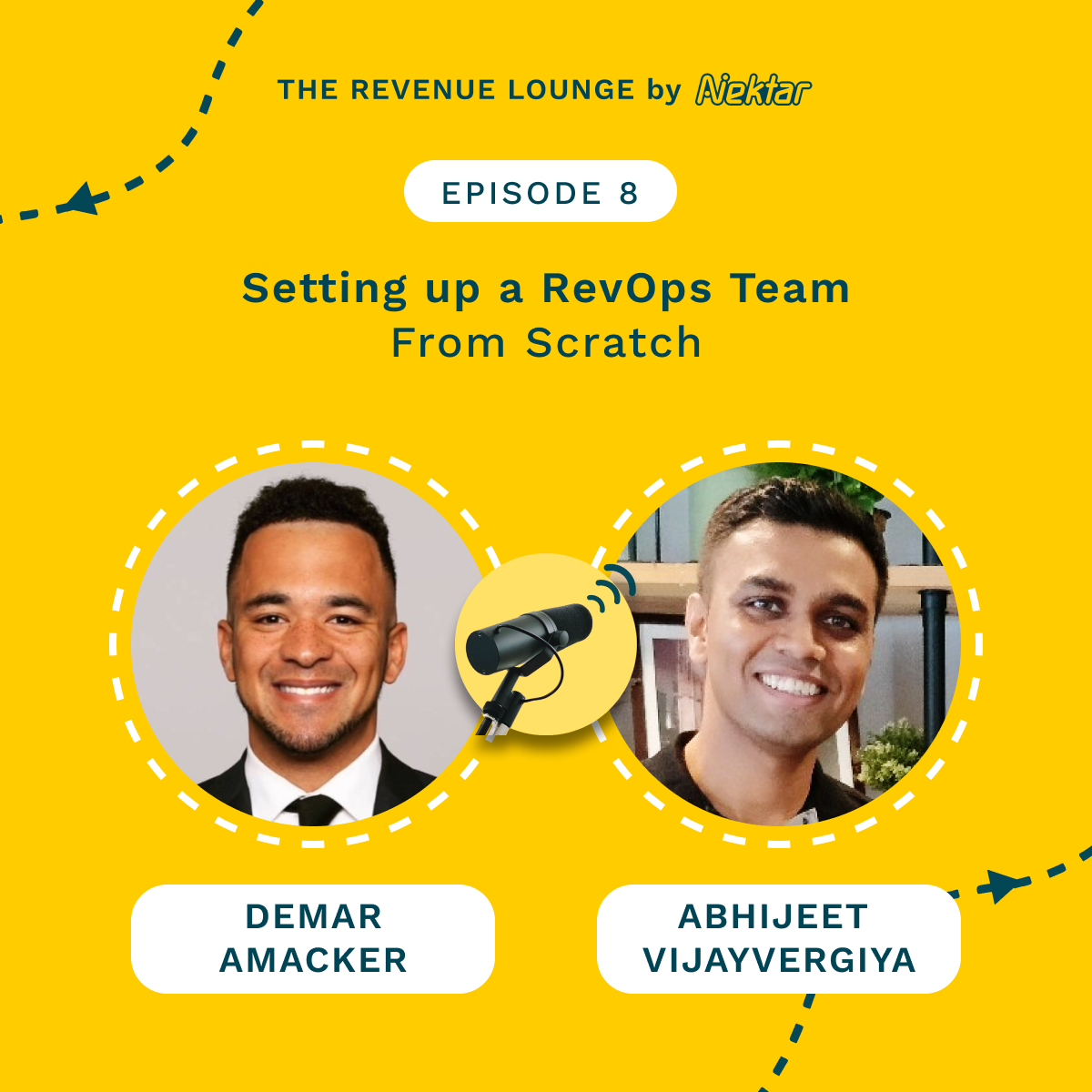
Ep #8: Setting Up a RevOps Team From Scratch
Listen Now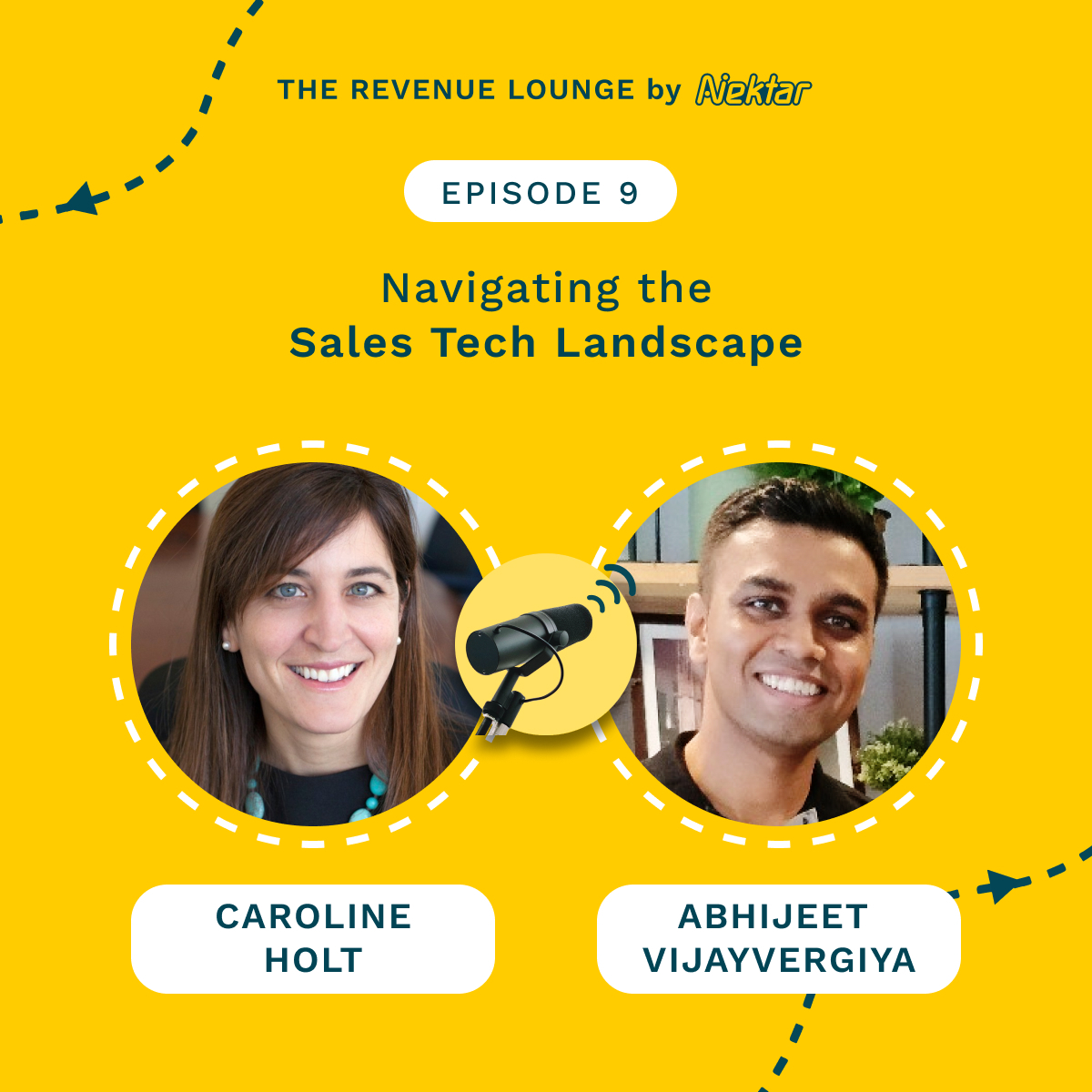
Ep #9: Navigating the Sales Tech Landscape
Listen Now